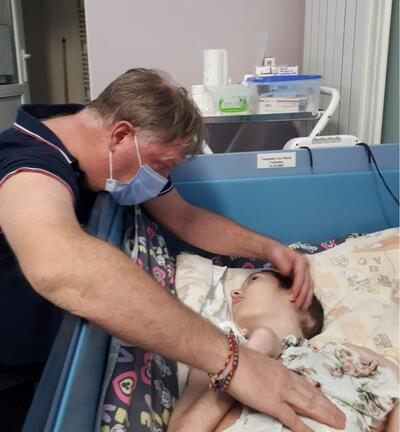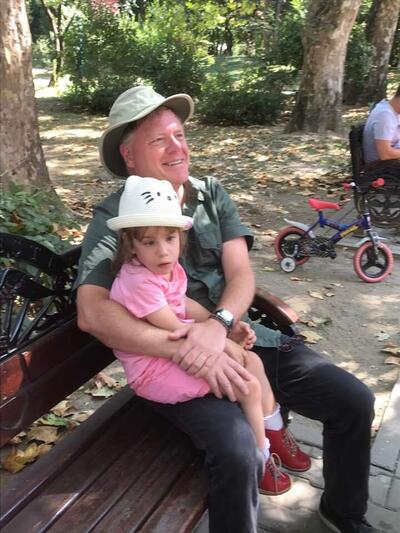By Melissa Kvidahl Reilly
A lifelong traveler, Steven Smith ‘02 M.Div. first explored Europe at age 17. He has now been to over 40 countries as a student, missionary, priest, teacher, and visitor. Today, living in Romania, he’s dedicated full-time to an organization that helps society’s most ostracized.
 According to the European Commission, about 8 percent of the Romanian population is Roma, a minority community that has faced centuries of oppression, slavery, persecution, and exclusion from mainstream society. As a result, Roma continue to suffer extreme poverty and the struggles that come with that—limited access to healthcare, education, employment, and more. The good news is that various organizations across Europe are working to serve this population, right generations of wrongs, and provide opportunities to improve their quality of life. A product of YDS and the Anglican Studies program at Berkeley Divinity School, Smith is an integral part of one such organization, currently dedicated to walking alongside the Roma community and others on the margins in Romania—a path he never could have predicted in the late 90s, a decade into his successful career as an attorney in Los Angeles.
According to the European Commission, about 8 percent of the Romanian population is Roma, a minority community that has faced centuries of oppression, slavery, persecution, and exclusion from mainstream society. As a result, Roma continue to suffer extreme poverty and the struggles that come with that—limited access to healthcare, education, employment, and more. The good news is that various organizations across Europe are working to serve this population, right generations of wrongs, and provide opportunities to improve their quality of life. A product of YDS and the Anglican Studies program at Berkeley Divinity School, Smith is an integral part of one such organization, currently dedicated to walking alongside the Roma community and others on the margins in Romania—a path he never could have predicted in the late 90s, a decade into his successful career as an attorney in Los Angeles.
Shifting gears
If you ask Smith why he decided to attend divinity school after establishing himself as an attorney, he’ll say he never decided any such thing. “I was meditating one day in my home and I had this overpowering experience—a call,” he says. “I resisted because I believed priests were supposed to be flawless and perfect, and I’m not that. I argued with God for a year about this.” While visiting a monastery in Santa Barbara, he again felt the same overpowering pull to ministry. He relented, gave up his law career, and headed east to Yale.
Smith’s home parish in Pasadena, Calif. was focused on social justice, and he brought this passion with him to New Haven. As a student intern, he spent three months on a mission in Nigeria, leading worship, teaching, and being present with the congregants. After graduation, he led various missions from three Episcopal churches in Manhattan. He brought congregants from the city’s affluent Upper East Side to Malawi, where they formed and fired bricks and built houses alongside communities facing severe poverty. He led groups to Haiti, where they worked with communities to build church pews and stabilize church buildings. He also brought church groups from Wall Street to New Orleans, to help neighborhoods rebuild after Hurricane Katrina.
Then, Smith was called as the rector at the Episcopal church in Munich, Germany. There, he encouraged his parish to consider mission work, and they ultimately decided to partner with an organization in Bucharest, Romania called Children in Distress, which works with children facing severe neurological diseases, terminal illness, and HIV/AIDS, most of them orphans who have been abandoned by their parents, as well as economically and socially disadvantaged children. “We fell in love with the organization’s work, their leadership, and the kids and young adults they serve,” Smith says. “Five years later, I decided it was where my heart is. I left Munich in 2019, moved to Bucharest, and dedicated my life full-time to working with these children and young people.”
Work and life in Bucharest
At Children in Distress, Smith spends some of his time fundraising and writing the magazine and other communications. But he also works directly with children served by the organization who live in a nearby hospice facility. Some are mobile and can move about or attend school; however, most are in a crib or bed, often on IV feeding or breathing tubes. “To me, mission ministry is a ministry of presence,” he says. “It means being there and showing that you love and care for them, that you are there with them on their journey through life, no matter how short or long it might be.”
Through his work with Children in Distress, Smith also supports a number of programs in Arges County, a very poor area of Romania populated mainly by Roma. “The Roma face severe ostracization and exclusion, some of it self-imposed as they wish to maintain their centuries-old traditions and culture; in turn, they also dislike and distrust mainstream Romanians,” he explains. “Our goal is to help them feel a part of Romanian life.”
Smith encourages Roma families to send their children to school, and the organization offers scholarships to children who prove they can sustain an academic career; the funds can be used for anything the family needs, from a laptop for school to clothes or food. Smith’s and his colleagues’ work there is nothing short of transformative. One school, which initially served a handful of children, is now “bursting at the seams” with Roma students, Smith says. “We’re having a real impact in that community by helping Roma parents accept that education is their child’s way to a better life,” he adds.
 Smith also ministers at a center serving young people with HIV/AIDS who need a place to live or need full-time care. “This is a vibrant place for young people, all of whom are orphans, most of whom are Roma, and some of whom were made to work on the streets at a young age,” he says. “They’re old enough to know that society doesn’t accept them, and that they’re on the margins. I go there to show them they’re not alone.”
Smith also ministers at a center serving young people with HIV/AIDS who need a place to live or need full-time care. “This is a vibrant place for young people, all of whom are orphans, most of whom are Roma, and some of whom were made to work on the streets at a young age,” he says. “They’re old enough to know that society doesn’t accept them, and that they’re on the margins. I go there to show them they’re not alone.”
Welcoming the stranger
When Russia invaded Ukraine in February 2022, Smith and his colleagues from Children in Distress sprang into action. They immediately headed to the border, spending several weekends meeting refugees before any formal infrastructure was created to support their arrival. “Our focus is the care of children, and many Ukrainian children were coming across the border with their mothers and grandmothers, so many with their only belongings stuffed into grocery bags,” he says. “We had to act.” They distributed groceries, diapers, and other supplies that they’d packed into their van, and invited refugees to join them on the journey back to Bucharest where, thanks to an arrangement with a local hostel, they had a place to stay and a warm meal. Smith and his colleagues would then help the refugees connect with family members across Europe, or begin the process of establishing themselves in Romania.
Putting his fundraising expertise to good use, Smith raised about 35,000 euros for the effort (the equivalent of around $38,000). At first, the money was used to stock a center where refugees could get food, clothing, and other essentials. After a year, as the refugee community settled in and their needs changed, Smith and his partners decided to use their resources to launch a child-care center. “We applied for and won a grant of 10,000 euros, which we use to feed the Ukrainian children at the daycare,” Smith says. The center currently serves about 250 children, and each child is fed breakfast, lunch, and two snacks. “When Russia first invaded Ukraine, Americans and people all over the world pledged their support and money; two years later, that support and those funds have evaporated,” says Smith. “My message is to not give up on Ukraine. Lives are at stake.”
Though Smith’s ministry has brought him all over the world, he emphasizes that every community, whether large or small, has an ostracized population in need of support. “I encourage everyone to look around them—you will see the people who are not welcome, who are left out, who are disregarded,” he says. “How can you as a Christian or person of faith invite them into a more full, ebullient life, and mobilize others to walk with them in their pain, poverty, or suffering? It is only in journeying together that we are all made whole.”
Melissa Kvidahl Reilly is a New Jersey-based writer and editor who specializes in higher and religious education as well as business-to-business subjects.